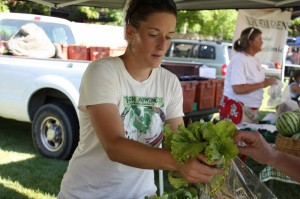Vonita Murray had a normal early adult life. She went to college, received a BA in photography with a minor in business, served in the 1st Gulf War and went to work. She spent over ten years in some form of Administrative/Office Management before becoming a CAD Technician. She was working at an architecture firm, when she was laid off in 2009.
“I had had enough of doing what other people told me to do with only the reward of a paycheck. AND I was sick of having a desk job. I have always been an active outdoors-loving woman and having to spend 8+ hours a day in front of a computer was making me miserable.”
 The epiphany she had after being laid off coupled with her desire to bring people good food led her to pursue edible landscaping. She soon realized that deep down she really wanted to be a farmer and took her passion one step further.
The epiphany she had after being laid off coupled with her desire to bring people good food led her to pursue edible landscaping. She soon realized that deep down she really wanted to be a farmer and took her passion one step further.
Farming/gardening is in her blood. Vonita’s grandfather was a farmer in Minnesota with a 1,000+ acres of corn, soy hogs and chickens. She grew up in Colorado on a three-acre lot. Her family always had a huge garden and lots of animals around like chickens, turkeys, and a horse. She has a green thumb, loves being outside and has never been afraid of hard work.
In January of 2011, she became a farmer. She leased four acres of land on which she grows a variety of vegetables, fruits and flowers, including green cauliflower, yellow strawberries and purple carrots. She wants to diversify and grow as many different crops as she can manage. She operates an 8-member small Community Supported Agriculture from her farm and has plans to grow it to 50 members. She sells her produce at the local farmers market and is developing restaurant accounts.
Even though Vonita studied business and farming is in her blood, she doesn’t have a formal education in farming. Every day presents a new challenge. She is learning the ins and outs of large scale crop production, succession planting and crop rotation. She is also learning the business side of farming including business planning, marketing, packaging, and direct sales through the Farmers Market and her CSA.
She is a quick learner and not afraid to ask questions. She started with the local office of the National Center for Appropriate Technology (NCAT), who provides technical information and resources for farmers. Then in April 2011, a few months after starting her farm, she saw a sign for Farmer Veterans Coalition (FVC) on one of her visits. They are headquartered in Davis, 15 minutes away from where she lives; so she drove to their office. She figured that because they are dedicated to helping vets and she was taking on a career in which she knew nothing, she had nothing to lose. She is glad she called.
“FVC helped me with all of their awesomeness,” said Vonita. ‘Awesomeness’ translates into research and information, volunteers and hard resources.
To help her with her farming and business challenges, FVC sent her several books, including one of crop rotation and the new organic grower, as well as information on chicken production and mushroom cultivation. Her relationship with FVC has gotten down and dirty, literally. On five separate occasions veteran volunteers from FVC (and the veterans from UC Davis) have worked on her farm. They started building a 1000 square foot hoop house (greenhouse), weeded fields, built her pallet compost area, planted starts, laid plastic mulch, ran irrigation and planted the start of a hedgerow. And FVC arranged donations from Home Depot to purchase much needed supplies and Vonita received a $5,000 fellowship grant that bought her the hoop house and compost fertilizer and irrigation supplied. The relationship is ongoing.
Her first year in business has been “awesome, one big expensive education in farming.” The number one thing that she has learned is that planning and paying attention to detail, are the keys to success. Her business is growing slowly and she doesn’t plan to hire anyone else until 2013.
Vonita also is deeply involved in her community. She is working with the agriculture professor at Woodland’s new Polytechnic Charter High School to devise a curriculum in which students will take what they learn in the classroom and apply it to the field. In other words, the farm will become their outdoor laboratory. Part of her long-term plan is to give back to those who have helped her by hiring fellow veterans.
“I am designing Mariposa Valley Farm to be a center of activity, where my community can come and learn what it feels like to be intimately involved with nature. Where their children can break away from their televisions, hold a tiny seed in their hands and experience the wonder of watching that tiny seed grow into the food they eat. Where I have the honor of teaching my community what I have learned along the way. And where my community, on the farm and off, grows and becomes richer.”
Visit Mariposa Valley Farm on the web for gorgeous photos of the farm.
